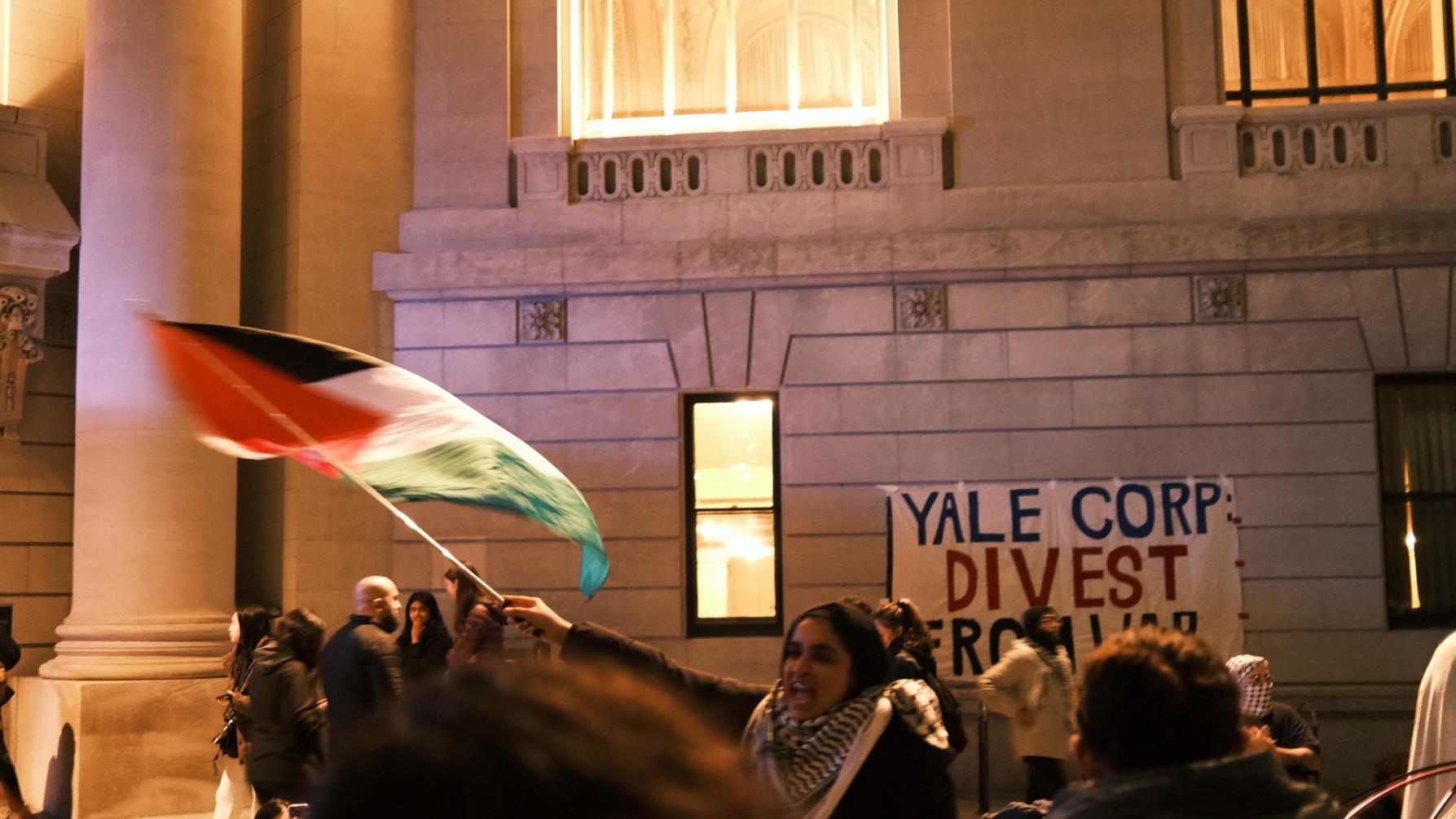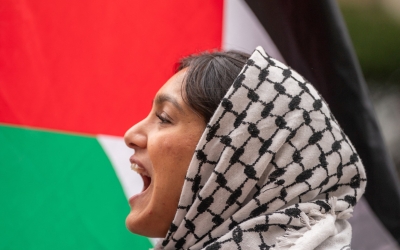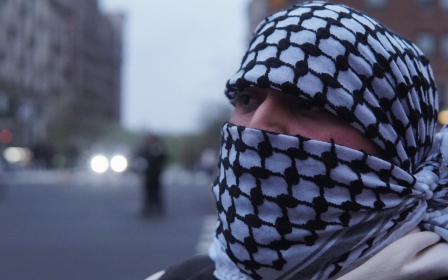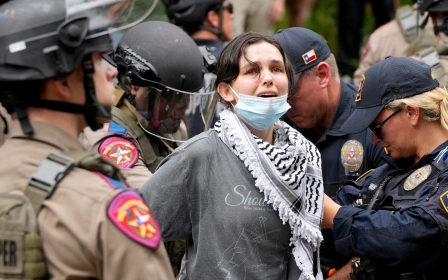US campus protests: From Yale to Gaza, we are globalising the intifada

In the weeks following the establishment of the first Gaza solidarity encampment in the US, much has been written on the subject of chants, antisemitism and campus culture wars in an effort to shift focus away from the genocidal acts taking place on the ground in Palestine.
As students organising in solidarity with the Palestinian people, we understand that we must reject this discourse. Our duty is to keep our demands principled, our solidarity unconditional and to keep all our eyes on Gaza.
We refuse to spread the Israeli occupation’s propaganda, to condemn the Palestinian resistance, to decentre Palestine in our organising, or to allow Yale University to continue its complicity in the genocidal war on Gaza.
The encampments at Yale and other university campuses have demonstrated that the masses of students, faculty and workers in this country will not rest until institutions of higher education disclose their investments, divest from the Israeli occupation and all companies complicit in war and colonisation, and reinvest in our communities - or, in the case of this institution, pay its fair share in taxes to New Haven.
In the words of National Students for Justice in Palestine, our movement is united behind actualising the ideal of a Popular University, “a university divorced from the fundamentally immoral economic and political system of the United States”, “a [university] in which teaching and learning happen for the benefit of the masses and the global community”.
This movement for a Popular University and a free Palestine is nothing short of a revolution or, in Arabic, an intifada, a term that Zionist propagandists have tried their hardest to misconstrue over the course of the past month.
Intifada comes from the Arabic verb nafada, which means “to shake”. An intifada is a noun that literally means “shiver, shudder, or tremor”, but is commonly used to describe moments in which something powerful is shaken or completely overthrown.
Just struggles
Although commonly associated with the resistance of Palestinians in the post-1967 period, the term has been used in the historiography of the Arab world much earlier. For example, there was the 1952 Iraqi Intifada, a mass movement in which students, workers, cadres of the Communist Party, and members of the Kurdish minority revolted against the Iraqi monarchy.
Then there was the 1965 Bahraini Intifada, in which the people of Bahrain revolted against British colonialism, precipitating the withdrawal of Britain from the Persian Gulf later in 1971. And there was the 1977 Egyptian Intifada, in which the people of Egypt rose up against their government’s neoliberal austerity policies.
Follow Middle East Eye's live coverage of the Israel-Palestine war
These are celebrated examples of colonised people fighting just struggles, by means of force, for liberation. Although, for whatever reason, an intifada in the Palestinian context is treated as an exception.
The First Palestinian Intifada began in 1987 in Jabalia refugee camp after two decades of Israeli military rule in Gaza and the West Bank. Palestinians rose up against their occupier in a mass movement characterised by civil disobedience, general strikes and armed resistance, prompting imperialist powers to initiate the treasonous normalisation process that led to the 1993 signing of the Oslo Accords.
The failure of Oslo to contain the Palestinian liberation struggle led to the Second Palestinian Intifada, a qualitatively more violent revolt that secured the relative autonomy of Gaza. As a result of the Second Intifada, the Israeli military withdrew from the occupied territory, colonial settlements were destroyed and a “liberated zone”, or cradle for the Palestinian resistance, was established.
The success of this revolt led to its mischaracterisation as a moment of antisemitic, Oriental barbarism, with comparisons drawn to the genocidal acts carried out by imperial Russia and Nazi Germany in pre-1945 Europe.
This brings us to the present moment - a moment in which people around the world are rising in support of a colonised people in their fight against genocide and are being portrayed as hateful, anti-Jewish racists as a consequence.
Fearless
Despite all the obfuscation, we refuse to accept frameworks that situate anti-Zionism in opposition to Judaism, police the language of our Palestinian brothers and sisters, or compel us to hesitate in openly declaring our support for Palestinian liberation.
The Palestinian revolution reached new heights in May 2021 with the Unity Intifada. During the second term of the 2020-2021 academic year at Yale, Palestinians in the Sheikh Jarrah area of East Jerusalem rose up against the Israeli occupation in order to protect their homes from expropriation by Israeli settlers.
The violent repression imposed on Palestinians in East Jerusalem led to resistance from Palestinians elsewhere in historic Palestine, including Gaza, the West Bank, and occupied ‘48.
The ethnic cleansing in Sheikh Jarrah and the bombardment of Gaza that year also produced resistance in the shatat (the Palestinian diaspora), which in our context led to the establishment of Yalies4Palestine by diaspora Palestinian Ruqaiyah Damrah of class 23 and others.
In the aftermath of May 2021, Yalies4Palestine has worked to “globalise the intifada” as it relates to the liberation of Palestine through campaigns, political education and cultural production, but also as it relates to the liberation of others through coalitional work with other campus organisations.
Because of our commitment to the liberation of all people, we are proud to have taken part in the encampments on Beinecke Plaza and Cross Campus this April in coalition with a multitude of other student organisations on this campus.
Despite Yale’s violent repression of student organising on 22 April, 30 April and 1 May, we will continue to support our fellow students across the country, to be fearless in our speech, to work to actualise a more just university and, most importantly, to be in active solidarity with the Palestinian people during this genocide. We are not afraid of those in power - they are afraid of us.
As demonstrated by the responses to our organising from the people of Gaza, we have finally begun to meet our obligations to them, to Palestine, and to each other. We have shaken Yale to its core. The student intifada does not stop here.
The views expressed in this article belong to the authors and do not necessarily reflect the editorial policy of Middle East Eye.
Middle East Eye propose une couverture et une analyse indépendantes et incomparables du Moyen-Orient, de l’Afrique du Nord et d’autres régions du monde. Pour en savoir plus sur la reprise de ce contenu et les frais qui s’appliquent, veuillez remplir ce formulaire [en anglais]. Pour en savoir plus sur MEE, cliquez ici [en anglais].





